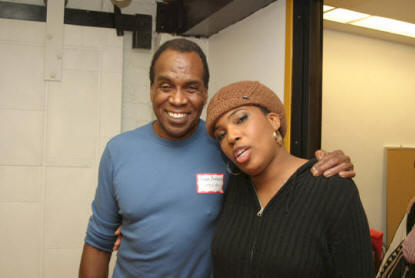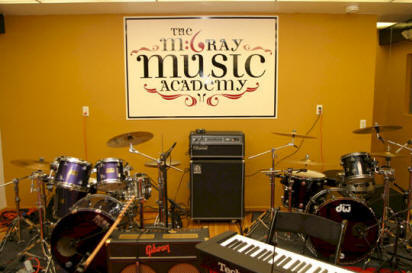 |
"Roger's Kids" - a unique vocal coaching method being shared with teenagers
As featured in Jive Magazine

The Music Column By Scott Detweiler www.detweilermusic.com
Photo courtesy of Rony ArmasMGRAY MUSIC ACADEMY IN NOHO
By Scott Detweiler
“Music Education is a tool to expose its students to beauty, confidence and self-expression. It encourages focus and discipline. It serves to cultivate imagination, individuality and excellence. It teaches collaboration and cooperation. Imagine what the world would be like if music was required learning for all students. The M. Gray Music Academy proposes that we can save the world through music education.”
Macy Gray ( www.macygray.com ) has just opened the M Gray Music Academy in North Hollywood and you have just read her mission statement.
The school is a magnificent facility, staffed by an incredibly experienced faculty and in an excellent location. I couldn’t believe it when Macy told me that it only took about a year to open the school from her initial conception. “I wanted kids to have something to do after school,” she went on to say.
The curriculum at the M. Gray Music Academy is intensive and is formulated to serve students at three different levels: Beginning Students (students learning an instrument for the first time), Lab Students (students with 1 – 3 years background) and Master Students (students with 3 or more years’ background). The vibe of the school is warm, non-intimidating and inspirational and open to all ages. Even adults.
Although Macy is known for her talent as a songwriter and vocalist and she studied classical piano, it would logically follow that there would have to be labs dedicated to the study of writing, singing and piano. But hold on. At the M. Gray Music Academy there are not only labs for writing, singing and piano, but also for the study of drums, percussion, mixing, production, guitar, bass, programming and composing as well! It is a living, relevant, modern, mini, music university.
Because Macy is such a brilliant vocalist, it is of no surprise that Vocal Lab would be a special department. One of the instructors that make the Vocal Lab such a special place is the person who actually trained Macy: renowned and well-known Hollywood voice coach, Mr. Roger Burnley (www.rogerburnley.com ). (Nice.) Roger is known for his world-renowned learning process that frees the student from any technical vocal limitations.
They would first meet around 1989 when Macy went to him for vocal training. Roger recalls that although she was shy, he could see that she was a unique talent. She would continue to study with him regularly and then return from time to time for assistance and consultation on specific vocal challenges.
Macy would also later send her back-up singers to train with Roger to learn techniques in voice preservation and maintenance, useful in combating vocal strain that is often suffered during extensive tours.
Roger said that having trained Grammy nominated Macy, watching her rise to certified multi-platinum status, and then being asked by her to become a member of the faculty at the M. Gray Music Academy is “the ultimate rewarding experience for a teacher.” (He is so proud of Macy. Congratulations, Roger!)
In addition to Roger, Dawn Beckman will be a faculty member of the Vocal Lab. The curriculum focuses on developing and increasing pitch, power and control, range, tonal quality and stamina. The students not only learn to sing but also to perform. Additionally, monthly seminars will be presented by recording artists (including Macy).
The other labs at the school, their focus and faculty members are as follows:
The Drum Lab, staffed by Al Pahanish and Marina Bambino, will primarily focus on hip-hop, rock, jazz, latin and soul. Renowned drummers Al Panahish and Kenny Dennis have designed the curriculum so that each student may develop their own creative style.
The Piano Lab, staffed by Dr. Tatiana Dutoit, will offer organ, synth and synth programming lessons, as well as song composition, orchestration and music direction. The lab contains nine new Yamaha electric pianos that can be played individually, with headsets or on a loudspeaker, in select ensemble pairings and groups of all sizes. Each piano is connected directly to the teacher’s unit for personal attention. The lab combines the best of acoustic piano study with all the advantages of electric keyboard.
The DJ Lab, staffed by producer and DJ, DJ Kiilu Grand, includes the art of listening and mixing records and turntable classes. Also included are field trips to record stores and production classes where the students learn to create his or her own mix tapes. They master all technical aspects of the turntables and gain a priceless knowledge of songs, albums and artists. Advanced classes teach the new Rhane Software. (Minimum age for DJ Lab is nine years old).
The Funk Lab, staffed by Michael Matarese, teaches Pro Tools, programming, drum programming and sound editing. This curriculum is a dynamic one that presents lessons in the latest hardware and software in this ever-evolving area of music. (Minimum age for Funk Lab is 13).
The Guitar and Bass Labs, staffed by Jason Golday, Josh Lopez, Dave Filice , Caleb Spier, and Dave Wilder will focus on modern jazz and funk. They will also examine the styles of masters such as Segovia, Jimi Hendrix and Prince to gain a consummate knowledge of rhythm and soloing in various styles of music.
The Film & TV Scoring Lab, staffed by Eimear Noon, will teach music theory, orchestration, string arrangement, and composition for film and TV.
All departments will coordinate for ensemble performances and recording.
The M. Gray Music Academy is an exciting, incredible facility and resource that will open the doors of creativity to our kids and bless our world with their artistic expression through music.
(Thank you, Macy.)
The M. Gray Music Academy (www.MgrayMusicAcademy.com), 4716 Vineland Avenue (just south of Lankershim Boulevard), North Hollywood, CA 91602. (818)508-8733,
fax (818)508-8966. A non-profit organization.©2005 Scott Detweiler. All Rights Reserved.
Scott is a compelling performer and an accomplished composer in his own rite. For more information, log on to www.detweilermusic.com, or write to info@detweilermusic.com.
Click here for a printer friendly version of this article.
Past Articles
Burnley Joins Faculty At M. Gray Academy
DVD Email Release
Vocal Health Concerns
Q: Can anyone learn to sing?
A: Absolutely! If someone has the physical ability to speak, then they have the mechanisms available to be able to learn to sing. Many people have been told they are tone deaf and therefore would not be able to correct that problem. I don't believe that is true and have proven it time and again. If a person is shown how to begin to hear tone/pitch and then given a focus within themselves to be able to match that pitch, then with time and practice they will develop that particular skill. Creating a tonal quality is also a very physical experience that when correctly demonstrated can be acquired by anyone. Think of it as you would learning to ride a bicycle. In the beginning you're trying to learn to keep your balance and probably falling off a bit. Then with practice, riding becomes second nature. It's the same thing with singing. You learn a very physical coordination that over time will become second nature. I will give very specific examples of this in my DVD “Roger Burnley’s EZ Vocal Method”™.Q: If I'm a professional already why should I study voice or take coaching lessons?
A: Improper use of your voice can lead to very serious vocal problems such as nodules, polyps, hoarseness, losing range, and fatigue. These are not natural occurrences. If you are experiencing any of these symptoms, a good vocal instructor can help you correct these problems and prevent you from going through many associated corrective procedures such as surgery, which can be hazardous to your vocal health.Q: Can I gain more range in my voice?
A: Yes. I give a blanket answer of yes to that question because practically every singer I've worked with has started out physically producing their voice in a way that limits the range they may acquire. Pushing, straining and yelling all involve certain muscles in the body that then block the ability of the vocal chords to do their optimum work in reaching the highest notes a singer is able to obtain in a comfortable way. Again this will be demonstrated fully in the video lessons.Q: How do I know if the vocal coach I've chosen is right for me?
A: You should know in the very first lesson! If you don't notice an ease in the way you are shown to produce sound, if what the instructor is telling you doesn't make sense to you, and if you don't feel completely comfortable, I suggest you keep shopping around. There are many wonderful coaches and teachers out there and you should know that you're getting the results you desire right from the very beginning.Q: Can I sing when I have a cold or a sore throat?
A: Generally speaking if there are no other vocal problems at the time of a simple cold, it is usually alright to still sing, especially if you have a performance scheduled. You might even find new areas of your voice when singing with a head cold. Now with a sore throat, that could be a different issue altogether. It is much too dangerous to sing with a sore throat because further damage to your vocal chords could occur. If at all possible it's much wiser to wait until any inflamation or soreness has subsided. If with complete voice rest for three or four days your voice dosen't return to normal, I would advise a visit with a good ENT (ear, nose & throat doctor) to thoroughly asses the problem.Q: What's happening when I am hoarse the next day following a performance or an extended rehearsal?
A: What that means is that you are not producing your vocal sound in a correct way and you may be headed for major problems with your vocal chords. I say vocal chords because that is ultimately where damage will end up even if what you think you're experiencing is tightness in your throat, a scratchy voice or roughness. You need to have a session with a reputable teacher who can objectively diagnose your problem. This will be demonstrated in the first private lesson or on my DVD “Roger Burnley’s EZ Vocal Method”™.
Home | About Roger | EZ Vocal Method DVD | Private Vocal Instruction Testimonials | FAQ | Vocal Tips | Sample Vocals | Links | Contact © 2005 Roger Burnley | Website by tonyontheweb.com |


